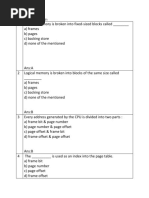0 ratings0% found this document useful (0 votes)
2 views01_Pointers_I
01_Pointers_I
Uploaded by
DestinyCopyright:
© All Rights Reserved
Available Formats
Download as PDF, TXT or read online from Scribd
01_Pointers_I
01_Pointers_I
Uploaded by
Destiny0 ratings0% found this document useful (0 votes)
2 views28 pagesCopyright
© © All Rights Reserved
Available Formats
PDF, TXT or read online from Scribd
Share this document
Did you find this document useful?
Is this content inappropriate?
Copyright:
© All Rights Reserved
Available Formats
Download as PDF, TXT or read online from Scribd
Download as pdf or txt
0 ratings0% found this document useful (0 votes)
2 views28 pages01_Pointers_I
01_Pointers_I
Uploaded by
DestinyCopyright:
© All Rights Reserved
Available Formats
Download as PDF, TXT or read online from Scribd
Download as pdf or txt
You are on page 1of 28
Pointers I
CEN116 Algorithms and Programming II
Introduction
• Pointers enable programs to
• accomplish pass-by-reference,
• pass functions between functions,
• manipulate strings and arrays, and
• create and manipulate dynamic data structures that grow and shrink at
execution time, such as linked lists, queues, stacks and trees.
Pointer Variable Definitions and Initialization
• A pointer contains the address of another variable that contains a
specific value
• The pointer points to that variable
• A variable name directly references a value
• A pointer indirectly references a value
• Referencing a value through a pointer is called indirection
Pointer Variable Definitions and Initialization
Pointer Variable Definitions and Initialization
Declaring Pointers
• Define countPtr as an int *—a pointer to an integer:
• int *countPtr;
• Read right-to-left, “countPtr is a pointer to int” or “countPtr points to an
object of type int.”
• * indicates that the variable is a pointer.
Pointer Variable Naming
• Our convention – end each pointer variable name with Ptr
• Other common naming conventions include starting the variable name with p
(e.g., pCount) or p_ (e.g., p_count)
Pointer Variable Definitions and Initialization
Define Variables in Separate Statements
• The * does not distribute to each variable:
• int *countPtr, count;
• countPtr is a pointer to int, but count is just an int
• Always write the preceding declaration as two statements to prevent ambiguity:
• int *countPtr;
• int count;
Initializing and Assigning Values to Pointers
• Initialize pointers when they’re defined, or assign them a value
• A pointer may be initialized to NULL, 0 or an address:
• NULL points to nothing.
• 0 is equivalent to NULL. NULL is preferred.
• Assigning a variable’s address to a pointer is discussed in next sections
Pointer Operators
• Unary address operator (&) returns the address of its operand
• int y = 5;
• int *yPtr = &y;
• initializes pointer variable yPtr with variable y’s address
• yPtr is then said to “point to” y
Pointer Operators
• The following diagram shows the preceding pointer’s representation in memory,
assuming that integer variable y is stored at location 600000 and the pointer
variable yPtr is stored at location 500000
Pointer Operators
• Unary indirection operator (*), also called the dereferencing operator
• Apply to a pointer operand to get the value of the object to which the pointer
points—known as dereferencing a pointer
• yPtr points to y, which is 5, so the following statement prints 5
• printf("%d", *yPtr);
• Dereferencing a pointer that has not been initialized with or assigned the address
of another variable in memory is an error
• Can cause a fatal execution-time error, accidentally modify data, produce
incorrect results, or lead to a security breach
Pointer Operators
• Next program demonstrates the pointer operators & and *
• Conversion specification %p outputs a memory location as a
hexadecimal integer on most platforms
• The & and * operators are complements of one another
• The addresses in the output will vary across systems that use different
processor architectures, different compilers and even different
compiler settings
Pointer Operators
1.#include <stdio.h>
2.
3. int main(void) {
4. int a = 7;
5. int *aPtr = &a; // set aPtr to the address of a
6.
7. printf("Address of a is %p\nValue of aPtr is %p\n\n",
&a, aPtr);
8. printf("Value of a is %d\nValue of *aPtr is %d\n\n", a,
*aPtr);
9. printf("Showing that * and & are complements of each
other\n");
10. printf("&*aPtr = %p\n*&aPtr = %p\n", &*aPtr, *&aPtr);
11. }
Pointer Operators
Address of a is 0x7fffe69386cc
Value of aPtr is 0x7fffe69386cc
Value of a is 7
Value of *aPtr is 7
Showing that * and & are complements of each other
&*aPtr = 0x7fffe69386cc
*&aPtr = 0x7fffe69386cc
Passing Arguments to Functions by Reference
• By default, arguments (other than arrays) are passed by value
• Functions often need to modify variables in the caller or to receive a
pointer to a large object to avoid the overhead of copying it (as in pass-by-
value)
• A return statement can return at most one value from a called function to
its caller—pass-by-reference can enable a function to “return” multiple
values by modifying the caller’s variables
• Pointers and the indirection operator enable pass-by-reference
• When calling a function with arguments that should be modified in the
caller, you use & to pass each variable’s address
• A function that receives the address of a variable in the caller can use the
indirection operator (*) to modify the value at that location in the caller’s
memory, thus effecting pass-by-reference
Passing Arguments to Functions by Reference
1. // Cube a variable using pass-by-value.
2. #include <stdio.h>
3.
4. int cubeByValue(int n); // prototype
5.
6. int main(void) {
7. int number = 5; // initialize number
8.
9. printf("The original value of number is %d", number);
10. number = cubeByValue(number); // pass number by value to
cubeByValue
11. printf("\nThe new value of number is %d\n", number);
12. }
13.
14. // calculate and return cube of integer argument
15. int cubeByValue(int n) {
16. return n * n * n; // cube local variable n and return result
17. }
Passing Arguments to Functions by Reference
1. // Cube a variable using pass-by-reference with a pointer
argument.
2. #include <stdio.h>
3. void cubeByReference(int *nPtr); // function prototype
4.
5. int main(void) {
6. int number = 5; // initialize number
7. printf("The original value of number is %d", number);
8. cubeByReference(&number); // pass address of number to
cubeByReference
9. printf("\nThe new value of number is %d\n", number);
16. }
17. // calculate cube of *nPtr; actually modifies number in main
18. void cubeByReference(int *nPtr) {
19. *nPtr = *nPtr * *nPtr * *nPtr; // cube *nPtr
20. }
Passing Arguments to Functions by Reference
• Passing the address enables pass-by-reference
• The function’s parameter is a pointer to an int called nPtr.
• The expression *nPtr dereferences the pointer
• The function assigns the calculation result to *nPtr—which is really the variable
number in main—thus changing number’s value in main
• Use pass-by-value unless the caller explicitly requires the called function to
modify the argument variable’s value in the caller
• Prevents accidental modification of the caller’s arguments and is another
example of the principle of least privilege
Passing Arguments to Functions by Reference
Use a Pointer Parameter to Receive an Address
• A function receiving an address must use a pointer parameter
• void cubeByReference(int *nPtr) {
Pointer Parameters in Function Prototypes
• The function prototype for cubeByReference specifies an int * parameter
• It’s not necessary to include pointer names in function prototype
• They’re ignored by the compiler
• But it’s good practice to include them for documentation purposes
Passing Arguments to Functions by Reference
Functions That Receive One-Dimensional Arrays
• The compiler does not differentiate between a function that receives a pointer
and one that receives a one-dimensional array
• The function must “know” when it’s receiving an array versus. a single variable
passed by reference
• A parameter of the form int b[] is converted to int *b
• The two forms are interchangeable
Bubble Sort Using Pass-by-Reference
• Let’s write a bubble sort program using two functions—bubbleSort
and swap.
• Function bubbleSort sorts the array.
• It calls function swap to exchange the array elements array[j] and
array[j + 1]
• Remember that C enforces information hiding between functions, so
swap does not have access to individual array elements in bubbleSort.
• Because bubbleSort wants swap to have access to the array elements
to be swapped, bubbleSort passes each of these elements by reference
to swap—the address of each array element is passed explicitly.
Bubble Sort Using Pass-by-Reference
• Although entire arrays are automatically passed by reference,
individual array elements are scalars and are ordinarily passed by
value.
• Therefore, bubbleSort uses the address operator (&) on each of the
array elements in the swap call to effect pass-by-reference as follows
• swap(&array[j], &array[j + 1]);
• Function swap receives &array[j] in pointer variable element1Ptr.
Bubble Sort Using Pass-by-Reference
• Even though swap—because of information hiding—is not allowed
to know the name array[j], swap may use *element1Ptr as a
synonym for array[j]—when swap references *element1Ptr,
it’s actually referencing array[j] in bubbleSort.
• Similarly, when swap references *element2Ptr, it’s actually
referencing array[j + 1] in bubbleSort
Bubble Sort Using Pass-by-Reference
• Even though swap is not allowed to say
int hold = array[j];
array[j] = array[j + 1];
array[j + 1] = hold;
precisely the same effect is achieved by
int hold = *element1Ptr;
*element1Ptr = *element2Ptr;
*element2Ptr = hold;
References
• C How to Program, Ninth Edition by Deitel & Deitel, Pearson, 2022.
You might also like
- Lab 2Document6 pagesLab 2xmallmall1961No ratings yet
- Rockchip Development Guide ISP20 en v1.6.4Document248 pagesRockchip Development Guide ISP20 en v1.6.4cvetaevvitaliyNo ratings yet
- Lecture 9Document33 pagesLecture 9Janshrut Singh ShekkhawatNo ratings yet
- Pointers and Pointer-Based StringsDocument21 pagesPointers and Pointer-Based StringsU2103097 STUDENTNo ratings yet
- Fundamentals of Computer Science: Lecture 21: PointersDocument24 pagesFundamentals of Computer Science: Lecture 21: Pointerspiyiwi4620No ratings yet
- 7.Lecture 7 9pointers 1Document27 pages7.Lecture 7 9pointers 1KAMAL PATINo ratings yet
- Pointers: These Are The Variables That Are Used To Hold The Address of Another VariableDocument38 pagesPointers: These Are The Variables That Are Used To Hold The Address of Another VariableJatin YadavNo ratings yet
- PointerDocument33 pagesPointerabhishek31krsNo ratings yet
- FEE 132 Computer LabsDocument33 pagesFEE 132 Computer LabsSimonNo ratings yet
- PointersDocument16 pagesPointersRuchita AgarwalNo ratings yet
- Module 1 - Chapter 10 PointersDocument67 pagesModule 1 - Chapter 10 PointersAditya AgarwalNo ratings yet
- Chtp9 Ch07 AccessibleDocument128 pagesChtp9 Ch07 AccessibleSuhan ERGUNERNo ratings yet
- Lecture 02: Pointers: Engr. Muhammad Asad Lecturer (EE) Institute of Space Technology, Islamabad Muhammad - Asad@ist - Edu.pkDocument14 pagesLecture 02: Pointers: Engr. Muhammad Asad Lecturer (EE) Institute of Space Technology, Islamabad Muhammad - Asad@ist - Edu.pkZERO REZANo ratings yet
- PointersDocument57 pagesPointerswhatever1234056789No ratings yet
- Unit IVDocument35 pagesUnit IVDark soulNo ratings yet
- Pointer c-1Document28 pagesPointer c-1devarshkaji29No ratings yet
- PointersDocument58 pagesPointersKamada Akshay VarmaNo ratings yet
- Copy Constructor and RecursionDocument26 pagesCopy Constructor and RecursionShehroze TalatNo ratings yet
- Unit 3 PCDocument70 pagesUnit 3 PCaakash sharmaNo ratings yet
- PointersDocument15 pagesPointersUlugbek KushakovNo ratings yet
- PointersDocument60 pagesPointersyaddhanapudi PRAVALIKANo ratings yet
- PointersDocument46 pagesPointersbeshahashenafe20No ratings yet
- PointersDocument15 pagesPointersManiacal DangerNo ratings yet
- POINTERSDocument29 pagesPOINTERSambika venkateshNo ratings yet
- Unit - IV - PointersDocument87 pagesUnit - IV - PointersMoniNo ratings yet
- Main PDF Lesson 5Document31 pagesMain PDF Lesson 5onecarloscruz111No ratings yet
- Procedural Concept: - The Main Program Coordinates Calls To Procedures and Hands Over Appropriate Data As ParametersDocument29 pagesProcedural Concept: - The Main Program Coordinates Calls To Procedures and Hands Over Appropriate Data As ParametersSantosh SutarNo ratings yet
- PointersDocument23 pagesPointersGursewak Singh0% (1)
- Lecture 1Document45 pagesLecture 1MUHAMMADASHARIB SIDDIQUINo ratings yet
- C++ CH 4 PointerDocument27 pagesC++ CH 4 Pointerabdumulate16No ratings yet
- Pointer C++Document14 pagesPointer C++Azan MehdiNo ratings yet
- Week 9Document38 pagesWeek 9bewahig513No ratings yet
- L8 - PointersDocument27 pagesL8 - Pointersalamin shawonNo ratings yet
- 13 PointersDocument49 pages13 PointersamemaqueenieNo ratings yet
- Pointers: Comp2115 - Information Structures Lecture NotesDocument7 pagesPointers: Comp2115 - Information Structures Lecture NotesramanahnkNo ratings yet
- C Chap07Document33 pagesC Chap07Goli PrabhakarNo ratings yet
- Pointers - PDFDocument21 pagesPointers - PDFsyedabraropNo ratings yet
- Lecture13 Pointers ArrayDocument26 pagesLecture13 Pointers ArraymkarunbharathNo ratings yet
- Unit III Pointers & StructuresDocument81 pagesUnit III Pointers & StructuresIndhunesan PackirisamyNo ratings yet
- C++ PointersDocument39 pagesC++ PointersJonathan BroquezaNo ratings yet
- C Module 5Document23 pagesC Module 5Pes 2000No ratings yet
- PointerDocument26 pagesPointerKashpia HamidNo ratings yet
- Chapter 4 - Part 2 - PointersDocument32 pagesChapter 4 - Part 2 - Pointersfilimonatsibeha48No ratings yet
- Module IIDocument42 pagesModule IIrameelaNo ratings yet
- Unit - V Pointers, Structures & Unions, Files: M.Srinivasa Rao, Ass - Prof, CSE DepartmentDocument24 pagesUnit - V Pointers, Structures & Unions, Files: M.Srinivasa Rao, Ass - Prof, CSE DepartmentMohan Shankar MummanaNo ratings yet
- 1st ChapterDocument22 pages1st ChapterKaranpal Singh JulkaNo ratings yet
- Programming For EngineersII - Lec02Document17 pagesProgramming For EngineersII - Lec02Shahid HanifNo ratings yet
- CP Unit-4 R19Document22 pagesCP Unit-4 R19Tarun sai PradeepNo ratings yet
- Object Oriented Programming: Asim Altaf ShahDocument25 pagesObject Oriented Programming: Asim Altaf ShahHasnain RaheemNo ratings yet
- Pointers: of An Another Variable. by Convention, Zero Represents The "Null" Pointer. Memory To Be AddressedDocument23 pagesPointers: of An Another Variable. by Convention, Zero Represents The "Null" Pointer. Memory To Be Addressedlakshmigsr6610No ratings yet
- Cs1104 - Unit IVDocument25 pagesCs1104 - Unit IVfrankvenas25No ratings yet
- Pointers Unit 4th 2nd SemDocument10 pagesPointers Unit 4th 2nd SemBhanu Prakash ReddyNo ratings yet
- PointersDocument35 pagesPointerssoubhagyalaxmisamal2221No ratings yet
- Pointers in C++Document22 pagesPointers in C++Akshat SoniNo ratings yet
- Computer Programming: PointersDocument8 pagesComputer Programming: Pointersibrahim mohammedNo ratings yet
- 4 PointersDocument13 pages4 Pointersviveknegi200345No ratings yet
- C Day - 2 Topics Covered 1. Pointers 2. Structures 3. Unions 1.0 Introduction To PointersDocument17 pagesC Day - 2 Topics Covered 1. Pointers 2. Structures 3. Unions 1.0 Introduction To PointersJayachandra JcNo ratings yet
- Pointers and ArraysDocument14 pagesPointers and ArraysJayant AsudhaniNo ratings yet
- 4.4 Call by ValueDocument15 pages4.4 Call by Valueaaryankamdar2005No ratings yet
- pointers - notesDocument12 pagespointers - notesKartikeyan PVJNo ratings yet
- PointerDocument25 pagesPointertahsif.cseNo ratings yet
- 06_LinkedListDocument4 pages06_LinkedListDestinyNo ratings yet
- 07_Functions_IDocument25 pages07_Functions_IDestinyNo ratings yet
- 07_StackDocument3 pages07_StackDestinyNo ratings yet
- 07_Dynamic_Data_Structures_IIDocument20 pages07_Dynamic_Data_Structures_IIDestinyNo ratings yet
- 07_QueueDocument3 pages07_QueueDestinyNo ratings yet
- 06_IterationDocument52 pages06_IterationDestinyNo ratings yet
- 06_Dynamic_Data_Structures_IDocument23 pages06_Dynamic_Data_Structures_IDestinyNo ratings yet
- 02_Algorithms_IDocument38 pages02_Algorithms_IDestinyNo ratings yet
- 04 StructuresDocument20 pages04 StructuresDestinyNo ratings yet
- 05_SelectionDocument31 pages05_SelectionDestinyNo ratings yet
- 05 Formatted Input OutputDocument33 pages05 Formatted Input OutputDestinyNo ratings yet
- 02_Pointers_IIDocument21 pages02_Pointers_IIDestinyNo ratings yet
- 03_Characters_and_StringsDocument47 pages03_Characters_and_StringsDestinyNo ratings yet
- 04_Introduction_to_CDocument67 pages04_Introduction_to_CDestinyNo ratings yet
- Linear Chapter 7Document13 pagesLinear Chapter 7DestinyNo ratings yet
- Linear Chapter 5Document18 pagesLinear Chapter 5DestinyNo ratings yet
- 03_Algorithms_IIDocument10 pages03_Algorithms_IIDestinyNo ratings yet
- bye bye byeDocument2 pagesbye bye byeDestinyNo ratings yet
- Linear Chapter 3Document28 pagesLinear Chapter 3DestinyNo ratings yet
- Linear Chapter 1.1Document25 pagesLinear Chapter 1.1DestinyNo ratings yet
- UE18EC305: Using Keil IDE (Assembly Level Programs) Cycle 1: Computer Organization Laboratory (0-0-2-1-1)Document7 pagesUE18EC305: Using Keil IDE (Assembly Level Programs) Cycle 1: Computer Organization Laboratory (0-0-2-1-1)nalinNo ratings yet
- EE-379 Embedded Systems and Applications: Real Time Operating Systems (RTOS) Part 1: Processes or Tasks and ThreadsDocument22 pagesEE-379 Embedded Systems and Applications: Real Time Operating Systems (RTOS) Part 1: Processes or Tasks and ThreadsaesyopNo ratings yet
- 226 BWDocument80 pages226 BWMohammad ZamaniNo ratings yet
- Library For Modbus Rtu (Lmrtu) : STEP 7 (TIA Portal) V14, SIMATIC S7-1200/1500Document33 pagesLibrary For Modbus Rtu (Lmrtu) : STEP 7 (TIA Portal) V14, SIMATIC S7-1200/1500Александр ШкодаNo ratings yet
- CSI247: Lab 1 - More Objects and Inheritance: Figure 1: UML Diagram of The Class HierarchyDocument2 pagesCSI247: Lab 1 - More Objects and Inheritance: Figure 1: UML Diagram of The Class HierarchyKitso GarekgathaneNo ratings yet
- Sunbeam OS Day4 MCQ'sDocument13 pagesSunbeam OS Day4 MCQ'sYash KuncolienkerNo ratings yet
- PSP FullNotes Backbencher - ClubDocument99 pagesPSP FullNotes Backbencher - Clubkaranphutane2254No ratings yet
- Drivers and The KernelDocument18 pagesDrivers and The KernelKiran AwaleNo ratings yet
- Kubernetes NamespacesDocument10 pagesKubernetes NamespacesmarcosnjNo ratings yet
- Parallel Prefix SumDocument32 pagesParallel Prefix Sumtab.abc.xyz.1No ratings yet
- 01 VMConAWS Immersion Day-Service Overview-Feb 2023 (46127)Document11 pages01 VMConAWS Immersion Day-Service Overview-Feb 2023 (46127)Yoany GomezNo ratings yet
- ESP8266 30A relay module(2024-10-04 00_26_27)Document8 pagesESP8266 30A relay module(2024-10-04 00_26_27)russepilNo ratings yet
- Datasheet N42B2P FinalDocument3 pagesDatasheet N42B2P Finaldanycorel01No ratings yet
- Cont CTLDocument484 pagesCont CTLKoke2301No ratings yet
- COMP600 Spring Lab#3Document4 pagesCOMP600 Spring Lab#3jassica sahiNo ratings yet
- Add, Edit, Delete and Run Access Queries With VBADocument5 pagesAdd, Edit, Delete and Run Access Queries With VBApartho143No ratings yet
- Solar Generator Buyer's Guide - Capability CalculatorDocument1 pageSolar Generator Buyer's Guide - Capability CalculatorChrisNo ratings yet
- Lec 10Document30 pagesLec 10Laraib HussainNo ratings yet
- Tutorial Innovus For PNRDocument46 pagesTutorial Innovus For PNRShyam PadaliyaNo ratings yet
- Weekly Home Learning Plan (Tle 7-Ict CSS) : Modular Distance Learning I 1 September 13-17, 20-24, 2021 7-ADocument13 pagesWeekly Home Learning Plan (Tle 7-Ict CSS) : Modular Distance Learning I 1 September 13-17, 20-24, 2021 7-ABayoyong Nhs100% (1)
- Boot Trace WindowsDocument42 pagesBoot Trace Windowsntd2521998100% (1)
- ADA234058Document188 pagesADA234058skorlipaNo ratings yet
- Hospital Management SystemDocument15 pagesHospital Management SystemRahul Singh0% (1)
- BS-120 Series&200 Series - Failure Feedback Form - V4.0 - ENDocument3 pagesBS-120 Series&200 Series - Failure Feedback Form - V4.0 - ENkirydownloadNo ratings yet
- Computer 2Document2 pagesComputer 2Kassandra KayNo ratings yet
- Programming and Data Structures: Debasis SamantaDocument63 pagesProgramming and Data Structures: Debasis SamantavittalNo ratings yet
- Mongo DBDocument22 pagesMongo DBBalaji Mani100% (2)
- spr2-310.816.02.07.02 Software VB13CDocument64 pagesspr2-310.816.02.07.02 Software VB13CLeodegario WrvietaNo ratings yet













































































































